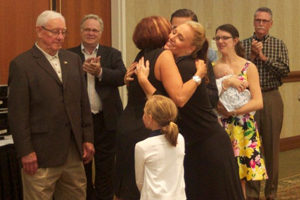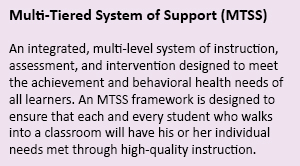There’s a rumor circulating around Kent ISD that Special Education Director Laurie VanderPloeg has a couple of identical sisters. Not just one, but two.
“But we haven’t been able to prove that,” says Bill Smith, VanderPloeg’s supervisor and assistant superintendent for instructional services. “We haven’t been able to get all of them together. If you looked at her calendar, you’d think that was true.”
In addition to serving as the ISD’s special education director, VanderPloeg is on the board of the Council of Administrators of Special Education (CASE), where she previously served as president. She also teaches in Grand Valley State University’s Special Education Administration program and is active in the Michigan Association of Administrators of Special Education (MAASE).
She has even been a competitive ballroom dancer. But that’s another story.
In June, VanderPloeg received the MAASE Beekman Award, the organization’s preeminent honor. Each year, a committee chooses an award recipient based on education, experience, professional organization involvement, and other qualities that identify the candidate as a distinguished leader in special education.
“It was very surprising, very humbling, to receive the award,” she says. “It’s certainly one that offers recognition from my peers for leadership and program development.”
Kent ISD Superintendent Kevin Konarska recalls working with VanderPloeg 30 years ago, when she was a special education teacher and he supervised secondary special education programs at Grand Rapids Public Schools.
It’s clear, says Konarska, that her work is not just a job. It’s something she truly loves to do.
“I think what stands out about Laurie is her energy level, her passion to do what’s right and find ways to support students,” he says. “That focus was there 30 years ago. That energy was there 30 years ago. And what’s amazing is that 30 years later, she has a higher level position but the commitment is still the same.”
VanderPloeg draws much of her passion from her mother, Margaret Boucha, who was a general education elementary teacher at Waverly Community Schools in Lansing in the 1960s. Boucha was one of four teachers in the district chosen to start a learning center for students with disabilities—what would be considered a resource program today.
“I think it waswatching her passion and drive for new learning and new program development—and to see the rewards of meeting individual student needs,” says VanderPloeg, who often visited her mother at the school. “She started off as my first mentor in the special education arena.”
After working as a special education teacher at the middle and high school levels in Grand Rapids, VanderPloeg stepped up as supervisor of special education programs. She then took on a role as assistant director of special education, in charge of compliance, monitoring, and parent support.
In her current role, VanderPloeg is particularly proud of a relatively new individualized instructional model in place within Kent ISD’s postsecondary programs. The model provides an individualized approach to helping students with disabilities ages 18 to 26 develop skills.
This is the third year the model has been in place, says VanderPloeg, and other ISDs have already expressed interest in replicating it.

Another achievement for Kent ISD, says VanderPloeg, is its successful multi-tiered system of support (MTSS). The ISD works closely with the Michigan Department of Education to provide support for students, by providing a safe, welcoming culture and a path to success. The ISD staff provides extensive training and leadership to help district and building teams get ready to use this program.
Many challenges accompany implementing MTSS in a large ISD, says her supervisor, Bill Smith, because it requires all districts to get on the same page. It also requires support from general education and school improvement staff.
“Laurie seems to find common ground in areas where it’s almost impossible to find an equitable solution that can balance the needs of an individual child versus needs of a district to provide those levels of support,” says Smith. “She knows how to get people to commit to what’s right.”
There’s still room for improvement, says VanderPloeg. This year, she wants to focus on improving graduation rates for students with disabilities. The ISD is collecting data on attendance, which is one of several dropout warning signs. Staff members will analyze the data and begin providing targeted supports to students who are chronically absent.
The issue is not just limited to high school students. Change will need to happen within elementary schools, where students often develop patterns of behavior that end in dropping out.
“It’s going to take full-system reform,” says VanderPloeg.
When she’s not poring over data or brainstorming new ways to help students succeed, VanderPloeg helps shape future administrators. She teaches in the Special Education Administration program at her alma mater, Grand Valley State University, and supervises students who are working on their supervisor practicum.
“To be able to provide instruction and resources and mentorship to aspiring or current special education administrators is very, very rewarding,” she says. “I love that part of my job.
CONNECT








